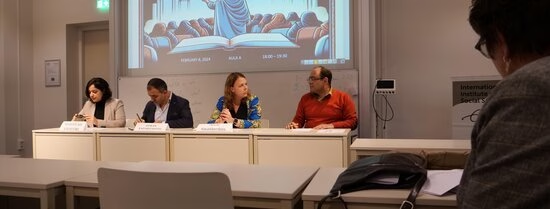What are the challenges experienced by women and girls in accessing education opportunities in Afghanistan and what can be done to counter them?
These were the main questions examined by three panellists during an event at the International Institute of Social Studies on 8 February 2024.
Three panellists, Shagofah Ghafori, a social researcher and the Secretary General of Afghanistan Centre for Peace and Democracy, Ofran Badakhshani, an Afghanistani poet and businessman, and Anne Kwakkenbos, a gender expert with Cordaid with extensive experience in Afghanistan, contextualized the social and historical roots of the position of women in order to fully appreciate the consequences of and potential approaches to mitigating an ever-growing disaster for Afghanistani women.
Only a month into the return of the Taliban in 2021, most women saw their dreams and aspirations dramatically cut short as the Taliban announced that all girls would be banned from attending secondary schools and universities.
The panellists placed this in the historical context of Afghanistan, identifying several currents in Afghanistani history but also warning of the dangers of over-simplification of Afghanistan's many cultural identitites and languages.
What can be done?
Acknowledging the immense challenges that remain as long as the Taliban retain central control of the country, each of the panellists envisioned approaches that might help mitigate the unfolding crisis for young women and girls.
They emphasized that taking small steps can also make a difference and discussed several ideas that could be used as intermediate solutions.
Offline or analogue systems
International actors can explore offline or analogue systems that can easily be scaled within communities. Examples include:
- the open-source learning app OneBillion.org can be used to localize and contextualize the learning modules to further facilitate the uptake and usage of this software
- finding ways to connect with young women in Afghanistan through virtual platforms or systems can also prove to be a vital outlet and connection to knowledge that might otherwise be restricted
Foreign scholarships
Universities outside Afghanistan can consider how to increase scholarship initiatives for Afghanistani women seeking opportunities outside the country. Such scholarships may provide women with the opportunity to advance their education and advocate for change from outside Afghanistan, to serve as mentors through virtual or informal networks, or to support families through remittance networks.
Government and university action
Universities and governments outside Afghanistan can amplify the voices of Afghanistani migrants, refugees and academics through existing networks or platforms so that the plight of women in Afghanistan can be continually registered within our societies.


